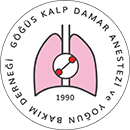

Kardiyopulmoner Bypass Uygulanacak Olgularda İnsülin İnfüzyonunun İinflamatuvar Mediatörler Üzerine Etkisi
Zeliha Özer1, Davud Yapıcı1, Gülçin Eskandari2, Arzu Kanık3, Kerem Karaca4, Aslı Sagün11Mersin Üniversitesi, Tıp Fakültesi Anesteziyoloji Ve Reanimasyon Ad2Mersin Üniversitesi, Tıp Fakültesi Biyokimya Ad
3Mersin Üniversitesi, Tıp Fakültesi Biyoistatistik Ad
4Mersin Üniversitesi, Tıp Fakültesi Kalp Damar Cerrahi Ad
AMAÇ: Kardiyopulmoner bypass (KPB) uygulaması klinik olarak ciddi problemler oluşturacak düzeyde sistemik inflamatuvar yanıta neden olmaktadır. Peroperatif ve erken postoperatif dönemde hiperglisemiyi kontrol altına almak için kullanılan insülin infüzyonunun antiinflamatuvar etkisi olduğu öne sürülmektedir. Bu nedenle, bu çalışmada farklı insülin infüzyon yöntemlerinin kan şekeri kontrolü ve inflamatuvar yanıt üzerine etkisini araştırmayı amaçladık.
YÖNTEMLER: Elektif kalp cerrahisi uygulanacak 37 hasta çalışma kapsamına alındı. Standart anestezi tekniği uygulanan hastalar rastgele iki gruba ayrıldı. Grup I (n=18) hastalara kan glukoz konsantrasyonu 180mg/dL olacak şekilde standart insülin infüzyon yöntemi kullanıldı. Grup II (n=19) hastalarda, kan glukoz düzeyi 70-110 mg/dL olacak şekilde, ayrı infüze edilen %20 dekstroz ile birlikte yüksek doz insülin infüzyonu (5mU/kg/dk) uygulandı. Her iki grupta da preoperatif ve postoperatif 0, 6,12 ve 24.st.lerde TNFα, IL6 ve IL8 düzeyleri çalışıldı.
BULGULAR: Grup II hastalarda kan şekeri kontrolünde daha başarılı olunduğu, peroperatif 90 (Grup I: 156,32 ± 64,55 mg/dL; Grup II: 116,68 ± 29,12 mg/dL, p<0.05) ve 120. dk ölçümlerinde (Grup I: 158,53 ± 58,49 mg/dL; Grup II: 116,37 ± 37,36 mg/dL, p<0.05) farkın belirginleştiği saptandı. TNFα düzeylerinin postoperatif 12 ve 24. st.lerde Grup IIde (medyan 5-4 pg/dL) ) Grup Iden (medyan 10-10 pg/dL) düşük olduğu belirlendi (p<0.01). IL6 ve IL 8 düzeyleri gruplar arasında farklılık göstermedi.
SONUÇ: Yüksek doz insülin uygulamasının kan şekeri kontrolünde daha etkili olduğu ve erken postoperatif dönemde inflamatuvar yanıt üzerine olumlu etkileri olabileceği düşünüldü.
Effect of Insulin Infusion on Inflammatory Mediators in Patients Undergoing Cardiopulmonary Bypass
Zeliha Özer1, Davud Yapıcı1, Gülçin Eskandari2, Arzu Kanık3, Kerem Karaca4, Aslı Sagün11Mersin University Medical Faculty, Deparment Of Anesthesiology And Reanimation2Mersin University Medical Faculty, Deparment Of Biochemistry
3Mersin University Medical Faculty, Deparment Of Biıstatistics
4Mersin University Medical Faculty, Deparment Of Cardiovascular Surgery
OBJECTIVE: Cardiopulmonary bypass causes a systemic inflammatory response that contributes to development of clinically serious problems. Insulin infusion administered for the control of hyperglisemia in preoperative and postoperative period was shown to have antiinflammatory effects. Therefore, in this study we aimed to investigate the effects of different insulin infusion techniques on blood glucose control and inflammatory response.
METHODS: Thirty seven patients undergoing elective cardiac surgery were included in the study. Patients anesthetized by standart technique were randomly divided into two groups. In Group I patients (n=18) standart insulin infusion was used to maintain blood glucose level at 180 mg/dL. Group II patients (n=19) were administered high dose insulin infusion (5mU/kg/min.) with a seperately infused %20 dextrose to adjust the blood glucose level at 70-110 mg/dL. TNF-α, IL-6 and IL-8 were studied preoperatively and postoperative 0, 6, 12 and 24. hours.
RESULTS: Blood glucose control was more successful in Group II patients(Grup I: 156,32 ± 64,55 mg/dL; Grup II: 116,68 ± 29,12 mg/dL, p<0.05) and this difference was more evident at 90 and 120.min. measurements (Grup I: 158,53 ± 58,49 mg/dL; Grup II: 116,37 ± 37,36 mg/dL, p<0.05). TNFα levels were lower at postoperative 12 and 24. hours in Grup II (medyan 5-4 pg/dL ) than Grup I (medyan 10-10 pg/dL) (p<0.01). There was no difference between IL6 and IL 8 levels between two groups.
CONCLUSION: It was thought that high dose insulin infusion is more effective in blood glucose control and it may have positive effects on inflammatory response in early postoperative period.
Makale Dili: Türkçe
(1511 kere indirildi)

















